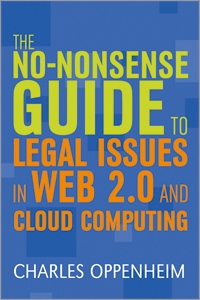
Primary tabs
You don't need to be an ALA Member to purchase from the ALA Store, but you'll be asked to create an online account/profile during checkout to proceed. This Web Account is for both Members and non-Members. Note that your ALA Member discount will be applied at the final step of the checkout process.
If you are Tax-Exempt, please verify that your account is currently set up as exempt before placing your order, as our new fulfillment center will need current documentation. Learn how to verify here.
- Description
- Table of Contents
- About the authors
- Reviews
Web 2.0 tools and cloud computing applications are now fundamental to libraries and information organizations, but many LIS professionals may be unaware of the legal issues involved with their use. This practical guide simplifies the legal principles concerning applications like YouTube, Facebook, Flickr, and Slideshare to ensure that readers use these tools safely and responsibly. It offers numerous examples of real-world problems and practical solutions, covering the major legal issues raised by Web 2.0, an overview of copyright, other intellectual property and related rights, freedom of information, cloud computing issues, liability issues, risk management approaches, licenses, and much more.
1. Introduction
- What is Web 2.0?
- Legal issues of Web 2.0
- The structure of this book
2. Copyright
- Introduction
- The legislation at a glance
- The formalities needed to get copyright
- Ownership of copyright
- Types of copyright materials
- Lifetime of copyright
- Restricted acts – or what can you do or not do to a copyright work?
- Infringement
- Legal ways of making copies
- Recent changes to the law
- Differences between UK and US copyright law
- A copyright checklist
- Conclusions
- Answers to exercises
3. Other intellectual property rights and related rights
- Introduction
- Database rights
- The rights enjoyed by the rights owners
- Moral rights
- Performers' rights
- Trademarks
- Domain names
- Patents
- Answers to exercises
4. Data protection and privacy
- Introduction
- UK data protection law
- Some definitions
- The rights of the data subjects
- Exemptions
- Transfer of data outside the EEA
- Cookies
- New laws coming?
- Answers to exercises
5. Freedom of information
- Introduction
- Some details
- FoI and research
- Exemptions
- The Information Commissioner
- Answers to exercises
6. Defamation
- Introduction
- Defences against a defamation action
- Possible changes to UK law
- Defamation law in the USA
- Across borders and other internet issues
- Conclusions
7. Cloud computing
- Introduction
- Cloud services and their contracts
- A slight digression on conflict of law
- Information security, data protection and the cloud
- Other legal issues
- Questions to ask a cloud service supplier before you sign up
8. Liability
- Introduction
- Contracts
- Tort
- Quality of electronic information
- Waiver clauses
- Other court cases
- Misleading information
- Employers' liability
- A model contract for those submitting user-generated content?
- Conclusions
- Answers to exercises
9. Useful sources
- Textbooks and reference works
- Web-based resources
- Blogs, Twitter feeds and discussion lists
Charles Oppenheim
Professor Charles Oppenheim is an internationally renowned expert, speaker, author and consultant on legal issues in LIS, particularly in copyright, data protection, freedom of information and cloud computing. He is an Honorary Fellow of CILIP, a member of the Legal Advisory Board of the European Commission, and of the Libraries and Archives Copyright Alliance.
Naomi Korn
Naomi Korn is Founder and Managing Director, NKCC.
"From the first page, the reader knows that this is an authoritative work. Oppenheim states that he is not a lawyer but rather a retired academic with great interest in how the law interacts with electronic information. This shows in Oppenheim's grasp of the issues and his ability to shed light on the issues in Web 2.0 and cloud-computing environments … It is highly recommended for all information-management professionals and students, especially those working in Web 2.0 and cloud environments."
--Australian Library Journal


